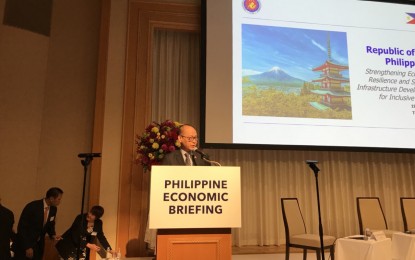
Department of Budget and Management Secretary Benjamin Diokno. (Photo by PCOO OSEC Media)
MANILA -- Budget Secretary Benjamin Diokno on Wednesday said the government has instituted measures to fast track the processing of foreign-assisted projects and to address underspending, as the country prepares for the shift to cash-based operations from multi-year budgeting.
“With the budget reforms we have put in place during the last two years, we have built a strong momentum towards improving the lives of Filipinos. This gives us much to look forward to and encourages us to continue in the implementation of our cash-based budgeting system,” Diokno said in his speech at the Philippine Economic Briefing in Tokyo, Japan.
Diokno noted that pending the approval of the Budget Modernization Bill, its main component, the shift to cash-based budgeting will be implemented starting fiscal year 2019.
The Budget Modernization Bill has already been approved in the House of Representatives on March 20, 2018. It is now up for plenary deliberations in the Senate.
“We expect it to be enacted into law in the third quarter of this year,” he said.
With the impending shift to annual cash-based budgeting, Diokno said, the issuance outlining the guidelines budgeting of foreign-assisted projects (FAPs) will be reviewed by the Department of Budget and Management (DBM) and Department of Finance (DOF) to further streamline processes.
These include the revision, if not outright elimination, of some of the documentary requirements needed in the release of Forward Obligational Authority (FOA), Multi-Year Obligation Authority (MYOA), and disbursement authorities for FAPs, he said.
“We note that while FOA is necessary for loan negotiation, the signed loan agreement is already sufficient to start the procurement process for multi-year projects,” he added.
Diokno added that the shift to an annual cash-based budget requires the review of many of government’s work processes.

“We have been highlighting to implementing agencies the need to specific turn-around-times and for streamlining of documentary requirements for work processes related to budget release, project implementation, and settlement of payables,” he added.
Diokno also asked development partners to set time that will be spent for the processing of necessary issuances related to the implementation of Official Development Assistance (ODA) projects, such as streamlining documentary requirements.
This will help partner implementing agencies in better planning for the implementation of the project and encourage the more efficient use of loans and grants, he said.
“We hope for the support of our development partners in this initiative. After all, it is in all of our best interests to ensure faster budget implementation and timely delivery of government services,” he added.
Diokno said some of the adopted measures in preparation for the shift to cash-based budgeting have also reduced underspending to 2.4 percent in 2017 from 3.6 percent the previous year.
The government, he said, has shortened the validity of the appropriations to one year by virtue of a line-item veto by the President, compelling the heads of government agencies to plan better and quicken the implementation of their projects and program.
He said the new Right-of-Way (ROW) law also makes it easier for government to expropriate private land.
Diokno said major infrastructure agencies have been provided with hefty budgets to settle ROW disputes, totalling PHP36.7 billion this year.
“Our budget system has become more transparent, efficient, and quicker. The ROW problem has been addressed. And underspending has been solved,” he added. (PNA)
